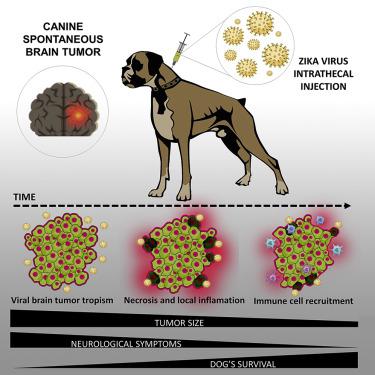当前位置:
X-MOL 学术
›
Mol. Ther.
›
论文详情
Our official English website, www.x-mol.net, welcomes your feedback! (Note: you will need to create a separate account there.)
Safety, Tumor Reduction, and Clinical Impact of Zika Virus Injection in Dogs with Advanced-Stage Brain Tumors.
Molecular Therapy ( IF 12.4 ) Pub Date : 2020-03-10 , DOI: 10.1016/j.ymthe.2020.03.004 Carolini Kaid 1 , Raquel Azevedo Dos Santos Madi 2 , Renato Astray 3 , Ernesto Goulart 1 , Luiz Carlos Caires-Junior 1 , Thiago Giove Mitsugi 1 , Ana Carolina Ramos Moreno 4 , Maria Fernanda Castro-Amarante 4 , Lennon Ramos Pereira 4 , Bruna Felício Milazzotto Maldonado Porchia 5 , Thais Oliveira de Andrade 1 , Vivian Landini 1 , Daniel Soares Sanches 6 , Carolina Gonçalves Pires 6 , Rubens Koji Oliveira Tanioka 2 , Marcia C L Pereira 1 , Igor Neves Barbosa 1 , Cristina O Massoco 7 , Luís Carlos de Souza Ferreira 4 , Oswaldo Keith Okamoto 8 , Mayana Zatz 1
Molecular Therapy ( IF 12.4 ) Pub Date : 2020-03-10 , DOI: 10.1016/j.ymthe.2020.03.004 Carolini Kaid 1 , Raquel Azevedo Dos Santos Madi 2 , Renato Astray 3 , Ernesto Goulart 1 , Luiz Carlos Caires-Junior 1 , Thiago Giove Mitsugi 1 , Ana Carolina Ramos Moreno 4 , Maria Fernanda Castro-Amarante 4 , Lennon Ramos Pereira 4 , Bruna Felício Milazzotto Maldonado Porchia 5 , Thais Oliveira de Andrade 1 , Vivian Landini 1 , Daniel Soares Sanches 6 , Carolina Gonçalves Pires 6 , Rubens Koji Oliveira Tanioka 2 , Marcia C L Pereira 1 , Igor Neves Barbosa 1 , Cristina O Massoco 7 , Luís Carlos de Souza Ferreira 4 , Oswaldo Keith Okamoto 8 , Mayana Zatz 1
Affiliation

|
Malignant brain tumors are among the most aggressive cancers with poor prognosis and no effective treatment. Recently, we reported the oncolytic potential of Zika virus infecting and destroying the human central nervous system (CNS) tumors in vitro and in immunodeficient mice model. However, translating this approach to humans requires pre-clinical trials in another immunocompetent animal model. Here, we analyzed the safety of Brazilian Zika virus (ZIKVBR) intrathecal injections in three dogs bearing spontaneous CNS tumors aiming an anti-tumoral therapy. We further assessed some aspects of the innate immune and inflammatory response that triggers the anti-tumoral response observed during the ZIKVBR administration in vivo and in vitro. For the first time, we showed that there were no negative clinical side effects following ZIKVBR CNS injections in dogs, confirming the safety of the procedure. Furthermore, the intrathecal ZIKVBR injections reduced tumor size in immunocompetent dogs bearing spontaneous intracranial tumors, improved their neurological clinical symptoms significantly, and extended their survival by inducing the destruction specifically of tumor cells, sparing normal neurons, and activating an immune response. These results open new perspectives for upcoming virotherapy using ZIKV to destroy and induce an anti-tumoral immune response in CNS tumors for which there are currently no effective treatments.
中文翻译:

Zika病毒注射剂对晚期脑肿瘤犬的安全性,减少肿瘤作用和临床影响。
恶性脑肿瘤是最具侵袭性的癌症,预后不良且没有有效的治疗方法。最近,我们报道了寨卡病毒在体外和免疫缺陷小鼠模型中感染和破坏人类中枢神经系统(CNS)肿瘤的溶瘤潜力。但是,将这种方法应用于人类需要在另一种具有免疫功能的动物模型中进行临床前试验。在这里,我们分析了巴西寨卡病毒(ZIKVBR)鞘内注射在三只携带自发中枢神经系统肿瘤的犬中的安全性,旨在进行抗肿瘤治疗。我们进一步评估了先天性免疫和炎症反应的某些方面,这些方面触发了在体内和体外施用ZIKVBR期间观察到的抗肿瘤反应。首次,我们发现在犬中注射ZIKVBR CNS后没有不良临床副作用,证实了该过程的安全性。此外,鞘内注射ZIKVBR可以减少患有自发性颅内肿瘤的免疫功能犬的肿瘤大小,显着改善其神经系统临床症状,并通过诱导肿瘤细胞的特异性破坏,保留正常神经元并激活免疫反应来延长其生存期。这些结果为即将到来的使用ZIKV进行病毒治疗以破坏和诱导CNS肿瘤中的抗肿瘤免疫反应开辟了新的前景,目前尚无有效的治疗方法。通过明显诱导肿瘤细胞的破坏,保留正常神经元并激活免疫反应,显着改善了它们的神经系统临床症状,并延长了它们的生存期。这些结果为即将到来的使用ZIKV进行病毒治疗以破坏和诱导CNS肿瘤中的抗肿瘤免疫反应开辟了新的前景,目前尚无有效的治疗方法。通过明显诱导肿瘤细胞的破坏,保留正常神经元并激活免疫反应,显着改善了它们的神经系统临床症状,并延长了它们的生存期。这些结果为即将到来的使用ZIKV进行病毒治疗以破坏和诱导CNS肿瘤中的抗肿瘤免疫反应开辟了新的前景,目前尚无有效的治疗方法。
更新日期:2020-03-10
中文翻译:

Zika病毒注射剂对晚期脑肿瘤犬的安全性,减少肿瘤作用和临床影响。
恶性脑肿瘤是最具侵袭性的癌症,预后不良且没有有效的治疗方法。最近,我们报道了寨卡病毒在体外和免疫缺陷小鼠模型中感染和破坏人类中枢神经系统(CNS)肿瘤的溶瘤潜力。但是,将这种方法应用于人类需要在另一种具有免疫功能的动物模型中进行临床前试验。在这里,我们分析了巴西寨卡病毒(ZIKVBR)鞘内注射在三只携带自发中枢神经系统肿瘤的犬中的安全性,旨在进行抗肿瘤治疗。我们进一步评估了先天性免疫和炎症反应的某些方面,这些方面触发了在体内和体外施用ZIKVBR期间观察到的抗肿瘤反应。首次,我们发现在犬中注射ZIKVBR CNS后没有不良临床副作用,证实了该过程的安全性。此外,鞘内注射ZIKVBR可以减少患有自发性颅内肿瘤的免疫功能犬的肿瘤大小,显着改善其神经系统临床症状,并通过诱导肿瘤细胞的特异性破坏,保留正常神经元并激活免疫反应来延长其生存期。这些结果为即将到来的使用ZIKV进行病毒治疗以破坏和诱导CNS肿瘤中的抗肿瘤免疫反应开辟了新的前景,目前尚无有效的治疗方法。通过明显诱导肿瘤细胞的破坏,保留正常神经元并激活免疫反应,显着改善了它们的神经系统临床症状,并延长了它们的生存期。这些结果为即将到来的使用ZIKV进行病毒治疗以破坏和诱导CNS肿瘤中的抗肿瘤免疫反应开辟了新的前景,目前尚无有效的治疗方法。通过明显诱导肿瘤细胞的破坏,保留正常神经元并激活免疫反应,显着改善了它们的神经系统临床症状,并延长了它们的生存期。这些结果为即将到来的使用ZIKV进行病毒治疗以破坏和诱导CNS肿瘤中的抗肿瘤免疫反应开辟了新的前景,目前尚无有效的治疗方法。


























 京公网安备 11010802027423号
京公网安备 11010802027423号